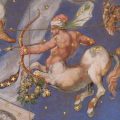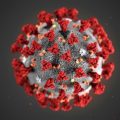Scorpio 2006
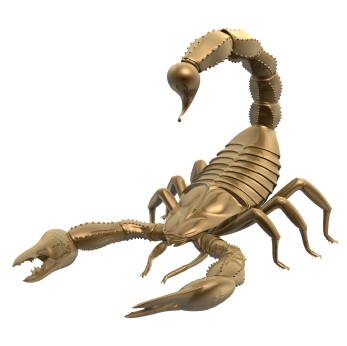
A scorpion – symbol of the astrological sign Scorpio
In this Scorpio post, the focus is on the planet (now dwarf planet) Pluto, since modern astrologers agree that Pluto ‘rules’ the sign of Scorpio.
Many people have asked “what does it mean for astrology now that Pluto is no longer a planet?” This naming decision by the IAU ( International Astronomical Union), in August this year, went against a lot of lobbying from many people on Pluto’s behalf. But Pluto still has ‘planet’ in its name even though it is a dwarf, or should we say size-challenged to be politically correct? Pluto has always been small so what’s in a name?
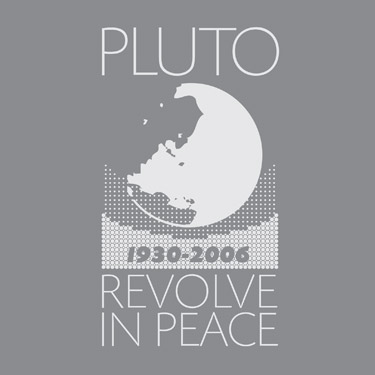
I was given a t-shirt with this image:)
The short answer to the question “what does it mean?” is … nothing! Astrologers will continue to use Pluto as they have always done since it was discovered in 1930. In fact we have even more work now, as Ceres (once a planet and pre August 2006, an asteroid) now has the same status as Pluto – she too became a dwarf planet. Even more worrying is the newest addition to the dwarf planet group, Eris, a body discovered in 2005. She can be a nasty piece of work, (more on this later). The jury is still out on where Sedna, a body that astrologers have been studying since its discovery in 2003, fits into the scheme of things. Many astrologers think she has something to do with tsunami’s, myself included, since she is an Inuit Goddess of the sea.
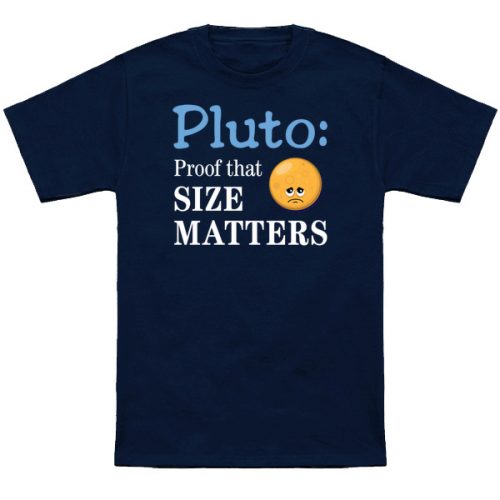
Pluto, true to his name, has divided the astronomical community. The naming vote was taken by a small minority of astronomers and many others do not agree with it. Alan Stern, NASA’s leader of the New Horizons Mission to Pluto for one, has stated that he will not use the definition. Mike Brown, whose team is credited with the discovery of Eris, is quoted as saying, “Pluto is a planet because culture says it is.”
We can clearly see here one of Pluto or Scorpio’s characteristics, the black and white opinions. There is nothing grey about a sign and planet that stand for passion, jealousy, power or sex on a good day, and fundamentalism, rape and terrorism on a bad day.
I would like to expand here on two themes:
- The idea that what happens to planets has a link with world consciousness
- Not unrelated, the idea that planetary fields can be seen as the morphic fields that Rupert Sheldrake describes and may therefore say something about our culture.
1. World consciousness
Astrologers often say that when a planet is discovered, there is a shift in the level of consciousness in the world. When Uranus, – a planet now denoting unrest, individuality, rebelliousness and authenticity – was defined as a planet in 1781, there were many rebellious struggles for independence, particularly in the US and France. When Neptune was discovered in 1846, many Neptunian ideals were coming to the fore: hospitals, gas lighting, séances and spirituality as we now define it, to name a few.
Pluto’s discovery in 1930 was a time of gangsters, the Nazi’s and psychology. Power, manipulation, death, research and digging and delving were common themes. These are all part of the Pluto archetype, which we are still, in my view, learning to work with. The world is not yet used to using power in a positive way. However we are becoming acutely aware that the way power is being used is unacceptable. Perhaps there is something in the collective unconscious that wants Pluto to be smaller and less troublesome.

A statue of Ceres in the Vatican. She is the goddess of grain and abundance among other things.
Enter Ceres …
… now an equal to Pluto. In the mythology Pluto abducts Ceres’ daughter, Prosperina (Persephone). Ceres has to get tough and refuse to allow anything to grow so that she can see her daughter for half the year. She is therefore known as the goddess of grain (cereals – read food supply?) and the seasons (read global warming?) since everything grows and flourishes when her daughter is with her above ground, and it is winter when Proserpina is in the underworld. Remember, until after the 1850’s, when she was mainly referred to as an asteroid, Ceres had been a planet since her discovery in 1801. So in 1930, on his discovery, Pluto outranked her. Until this year. Are we somewhere deep down aware of the fact that we must give the feminine nurturing aspect of life, more credence to get Pluto under control? Is this the way we solve the earth’s problems? By understanding the nature of Ceres? Perhaps she can get our destructive, kidnapping power under control. Or at least negotiate something for the sake of our children.
But now enter Eris, the sister of the God of War, Mars (Ares). We have evoked a feminine Goddess that makes Mars look like a pussy cat. She can even put Pluto to shame with her destructive powers. All men feared her. She revelled in war and laughed at the destruction of life on every battlefield. Bloodthirsty to the core, she is credited as having started the Trojan War by causing strife amongst the goddesses. She is the queen of discord and chaos. What does this mean for our world today? There are shades of this ‘revelling in destruction’, present everywhere. Is our world consciousness at such a level that we have created her? Or is it the other way around? Is she sent to finish us off? Or make it obvious that we must have a different set of thoughts and actions. How bad does it have to get?
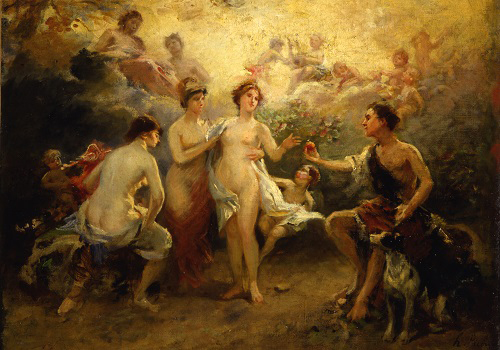
The judgment of Paris by Henri-Pierre Picou. It was Eris that set up the competition to win a golden apple that Paris had to judge.
2. Pluto as a morphic field
And that brings me to the idea of co-creation. In my view, Sheldrake’s theory of morphic fields could be a good model for discussing basic planetary principles in astrology. This theory has the basic idea that memory is stored in fields outside the physical body, both in plants and animals and of course in man.
Sheldrake: “ The term (morphic field) is more general in its meaning than morphogenetic field, and includes other kinds of organizing fields in addition to those of morphogenesis; …..the organizing fields of animal and human behaviour, of social and cultural systems, and of mental activity can all be regarded as morphic fields which contain an inherent memory.”[1]
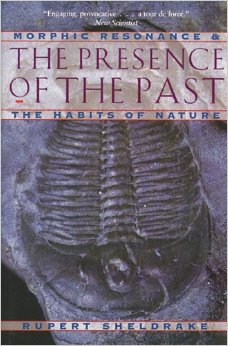
Sheldrake’s book originally published 1988
My understanding of this is that, for example, an astrologer, who belongs to the collective group ‘astrologers’, can tap into everything that astrologers have done before, but can also modify the field by her actions and thoughts. But also that a morphic field is like the collective unconscious.
So let’s imagine that Pluto is a conscious entity. When he was discovered, we became conscious that our universe was even bigger than we had thought. In fact I would venture to say that we discovered him because our global consciousness was, and still is, expanding. We gave him a name appropriate to what was developing in terms of consciousness at the time. We then interacted with him. We observed his behaviour, although he was difficult to see (like the Pluto archetype, very private perhaps). At first we, as astrologers, tried out meanings until today we have a consensus in astrology (to the extent that we ever do), about his meaning. As each book gets written, this adapts and changes as we discover new things and come up with new ideas. At first he was given terrible attributes, but as we develop we give him more pleasant attributes.
In the morphic field theory we could say that certain people (those with the Scorpio archetype featuring strongly) resonate with the Pluto morphic field. They tap into the field and join the Pluto club so to speak, and therefore must follow the Pluto norms. So the field stabilises, and all Scorpios follow the Pluto path. So the more we say, for example, that Scorpios are jealous and vindictive, the more we create the idea that they will be, and the more difficult it becomes for them to break out of the mould. And the more we say that Pluto is heavy and difficult, the more he goes along with that and creates havoc. Together we create a reality based on the consciousness of Pluto and what we think, say and believe about him.
What’s in a name?
So what does he think about his new name I wonder? My guess is, since he is still in the garb of Sagittarius until 2008, he is too busy trying to transform travel, religion, the church and our belief systems, (unfortunately using his dark side) that he has no time to take any notice of what he thinks of as trivial. Maybe we should take a better look at his light side and try some positive transforming using his good qualities of deep understanding and research.
So I agree with Mike Brown. Pluto is a planet because culture (the morphic field we have co-created) says it is. We shouldn’t be fooled by his ‘demotion’. His powers are still definitely intact.
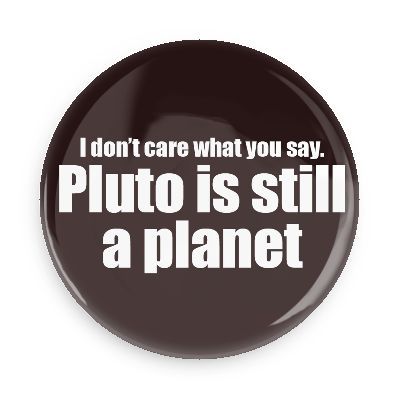
from wackybuttons.com
[1] Sheldrake, The Presence of the Past, pp.112-113.
Uruzgan – Netherlands – an update
In the Cancer issue (see Cancer 2006 post) I wrote about a process the Netherlands finds herself in, which involves Pluto. I looked at two important dates: January 3 and July 3 and made some comments about the last date of this process which has now, as I write this, just passed:
“November 3: In view of the Pluto threads here, no black and white decisions, war, deaths – all Pluto topics, it is reasonable to assume that the last date will most likely involve Afghanistan and in some way will transform the leadership of the country. I suspect the results of sending troops will be clearly visible and rage at what has happened may be one of the outcomes. Balkenende and his party will probably have to take the brunt of the responsibility for this and may feel the consequences of their earlier hesitation. It will be interesting to see how Balkenende, and indeed other party leaders, handle such a topic just before elections. It is hoped that our leaders will decide with passion and clarity what needs to be done in Afghanistan before this date, as powerful leadership is needed here for a good result.”
What appears to have happened in Afghanistan, although it is not always clear until a later date, especially when Pluto, the planet of secrecy is involved, is that power has been taken. The Netherlands General Major Ton van Loon now has control of the NAVO mission in South Afghanistan and the Netherlands Minister of Foreign affairs was in Afghanistan on November 3. He spoke with leaders there and emphasised the need for them to fulfil their part of the bargain to supply more troops. If you believe the press, he presents as a powerful and decisive leader and is now positive about the Netherlands rebuilding mission. Time will tell if this date is indeed the end of a (hopefully now positive) cycle.
Faye Blake-Cossar
Interesting website of the month
This month I want to recommend a book, rather than a website, that has connections with the thoughts above. It is “Boomeritis: a novel that will set you free”, by Ken Wilber. His explanation of Spiral Dynamics in this book explains among many other things, the levels of consciousness in the world today.
IAU definitions – planets and dwarf-planets
This month’s quote
“Those who control their passions do so because their passions are weak enough to be controlled.” William Blake 1757-1827.






